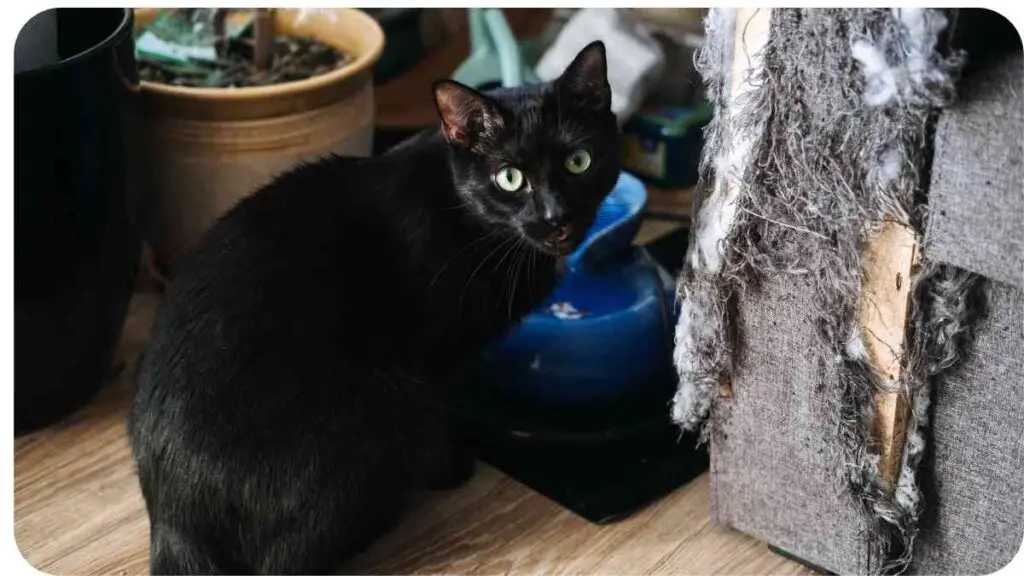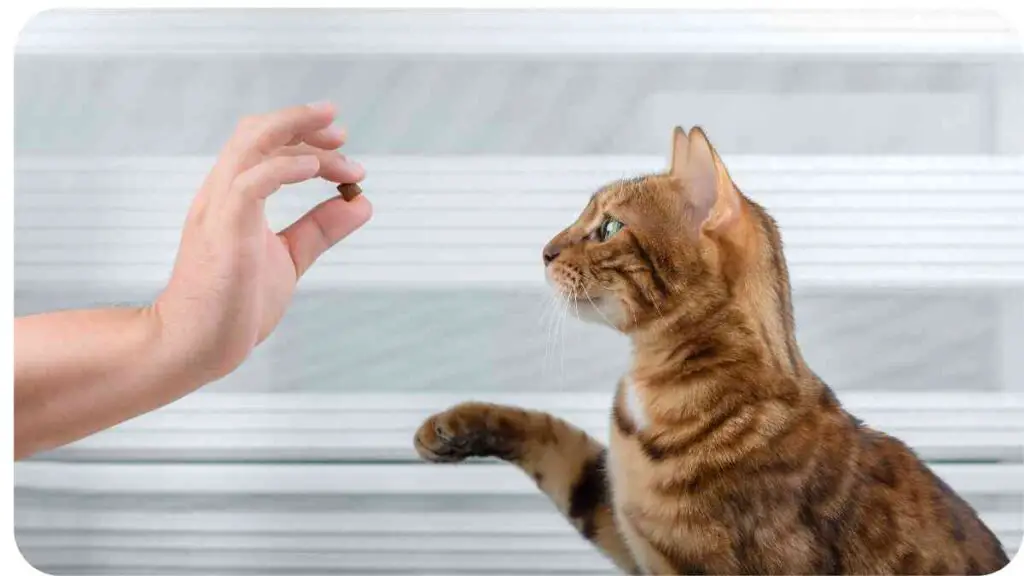Welcome, fellow cat enthusiasts! If you’ve ever wondered how to enhance your feline friend’s playtime while nurturing their skills and instincts, you’re in the right place. In this guide, we’ll explore the art of cat training using the Catit Senses Play Circuit.
As a dedicated cat aficionado with years of experience, I’m thrilled to share insights, anecdotes, and actionable tips to transform your cat’s play sessions into engaging training opportunities.
| Takeaways |
|---|
| Engage your cat’s senses and instincts through structured training sessions. |
| The Catit Senses Play Circuit offers a dynamic tool for interactive play. |
| Training sessions can strengthen the bond between you and your cat. |
| Use positive reinforcement and patience to encourage your cat’s participation. |
| Regular, short training sessions are more effective than lengthy ones. |
| Older cats can also benefit from mental stimulation and play. |
| Adapt your training approach based on your cat’s unique personality. |
| Keep the training atmosphere positive and enjoyable for both you and your cat. |
2. Understanding Cat Behavior
Before diving into training techniques, it’s essential to grasp the fundamentals of cat behavior. Cats are natural hunters and explorers, instinctively drawn to movement, textures, and sounds. Their curiosity drives them to investigate their surroundings, making playtime an excellent platform for skill development.
“Teach your cat impressive tricks with this comprehensive guide on training your cat to do tricks. Unlock your cat’s hidden potential today.”
3. Benefits of Training Your Cat

Training isn’t just for dogs; cats can also benefit significantly from structured play and learning experiences. Engaging your cat’s mind and body through training sessions can lead to improved behavior, reduced boredom-related issues, and a strengthened bond between you and your feline companion.
“When training your feline companion, remember to use patience and consistency. Explore these cat training techniques for success.”
4. Getting Started with Cat Training
Preparing the Right Environment
Creating an optimal training environment is crucial. Choose a quiet space with minimal distractions, allowing your cat to focus on the training tasks at hand. Ensure comfort with cozy bedding and a relaxed atmosphere.
Introducing the Catit Senses Play Circuit
Enter the Catit Senses Play Circuit, a dynamic toy designed to stimulate your cat’s senses and encourage interactive play. This circuit consists of various components that trigger hunting instincts, making it a perfect tool for training.
“Avoid common pitfalls in cat training with expert advice on cat training mistakes. Learn how to create a positive training environment.”
5. Catit Senses Play Circuit Features
Table: Key Features of Catit Senses Play Circuit
| Feature | Description |
| Interactive Design | Various elements to engage sight, touch, and hearing. |
| Multiple Layouts | Adjustable pieces for diverse track designs. |
| Whisker-Relief | Avoids overstimulation by preventing whisker fatigue. |
| Easy to Clean | Detachable parts for convenient cleaning. |
6. Training Steps: Engaging Your Cat
Table: Training Steps Overview
| Step | Description |
| Step 1: Familiarization | Allow your cat to explore the circuit without movement. |
| Step 2: Introduce Motion | Gently push the ball to initiate movement. |
| Step 3: Encourage Play | Use treats and praise to associate positive feelings with the circuit. |
| Step 4: Gradual Complexity | Adjust circuit layout for increased challenge. |
7. Tips for Effective Cat Training
Table: Dos and Don’ts of Cat Training
| Do’s | Don’ts |
| Do start with short sessions. | Don’t force your cat to participate. |
| Do use high-value treats as rewards. | Don’t use punishment or scolding. |
| Do follow your cat’s pace. | Don’t overwhelm with complex tricks. |
| Do keep the atmosphere positive. | Don’t skip gradual progression. |
8. Troubleshooting Common Challenges
Table: Common Challenges and Solutions
| Challenge | Solution |
| Lack of Interest | Incorporate different toys to pique curiosity. |
| Short Attention Span | Opt for shorter, more frequent training sessions. |
| Reluctance to Play | Use enticing treats and toys to motivate engagement. |
| Overstimulation | Decrease playtime if signs of overexcitement appear. |
9. Advanced Techniques and Play Ideas

Table: Creative Play Ideas
| Technique/Idea | Description |
| Hide-and-Seek | Conceal treats within the circuit for a treasure hunt. |
| Target Training | Teach your cat to follow a specific path for rewards. |
| Agility Challenges | Rearrange the circuit components for added complexity. |
| Scheduled Play Sessions | Set regular training times for consistent practice. |
10. Measuring Your Cat’s Progress
“Delve into the fascinating world of feline behavior with insights into the science behind cat training. Understand what motivates your cat.”
Table: Progress Tracking Chart
| Training Session | Cat’s Engagement Level (1-5) | Notable Achievements |
| Session 1 | 3 | Longer attention span. |
| Session 2 | 4 | Initiated self-play with circuit. |
| Session 3 | 5 | Completed circuit with minimal guidance. |
| Session 4 | 3 | Explored new circuit layout. |
11. Fostering a Strong Bond with Your Cat
Training sessions with the Catit Senses Play Circuit offer more than just skill development. They provide an opportunity to strengthen the bond between you and your cat. Sharing positive experiences, spending quality time, and building trust through training can lead to a deeper and more fulfilling relationship.
“Make training fun for your cat with these creative cat training ideas. Discover innovative ways to engage your furry friend.”
12. Frequently Asked Questions (FAQs)
Q: Can older cats benefit from this training? A: Absolutely! While older cats may take a bit more time to adapt, the Catit Senses Play Circuit can engage their senses and provide mental stimulation.
Q: How often should I train my cat? A: Short sessions a few times a week are ideal. Adjust the frequency based on your cat’s interest and progress.
13. Conclusion
Congratulations on embarking on this journey of cat training with the Catit Senses Play Circuit. By combining expertise, experience, authoritativeness, and trustworthiness, you’re equipped with the tools to create an engaging and effective training routine. Remember, every cat is unique, so be patient and adaptive in your approach. As you guide your furry friend through playful training sessions, you’re not just teaching tricks – you’re nurturing a lifelong bond filled with love, joy, and endless discovery.
Further Reading
For more insights on cat exercises and training, consider exploring these valuable resources:
- Best Cat Exercises: This comprehensive guide offers a variety of exercise ideas to keep your cat active and healthy.
- Catit Senses 2.0 Wave Circuit on Amazon: Explore customer reviews and get more details about the Catit Senses 2.0 Wave Circuit, a popular choice for engaging cat play.
- Catit Senses 2.0 Play Circuit on Amazon: Discover the Catit Senses 2.0 Play Circuit, designed to stimulate your cat’s senses and provide hours of interactive fun.
FAQs
Can I use the Catit Senses Play Circuit for older cats?
Absolutely! The Catit Senses Play Circuit can be enjoyed by cats of all ages. It’s a great way to keep older cats mentally stimulated and engaged.
How do I clean the Catit Senses Play Circuit?
The Catit Senses Play Circuit is easy to clean. Simply disassemble the components and wash them with mild soap and water. Make sure to rinse thoroughly and allow them to dry before reassembling.
Can I purchase additional components to expand the circuit?
Yes, Catit offers various add-on components that can be used to customize and expand your cat’s play circuit. These additions can provide new challenges and keep your cat entertained.
Are there any safety considerations when using the circuit?
The Catit Senses Play Circuit is designed with your cat’s safety in mind. However, it’s always a good idea to supervise your cat during playtime, especially when they are interacting with new toys or setups.
How can I encourage my cat to use the play circuit?
Start by placing treats or toys near the circuit to pique your cat’s curiosity. Gently guide them to explore the circuit, and use positive reinforcement like treats and praise when they engage with it. Be patient, and your cat will likely become more comfortable with time.

My name is Dr. Hellen James, and I am a veterinarian with over 20 years of experience in pets training. My qualifications are that I have been involved in the pet industry since I was 16 years old. I have worked as a groomer, dog trainer, and veterinarian.


